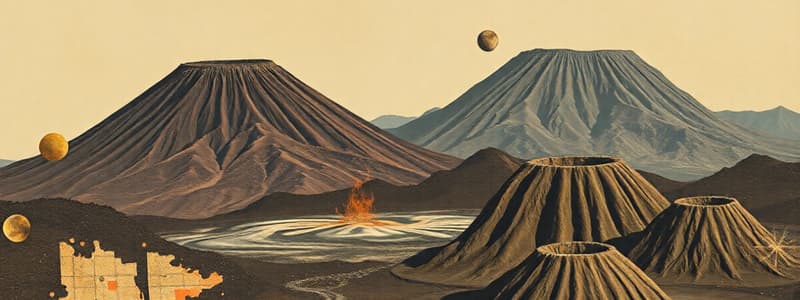Podcast
Questions and Answers
A volcanic ______ is created when part of the crater collapses after an explosive eruption.
A volcanic ______ is created when part of the crater collapses after an explosive eruption.
caldera
Shield volcanoes are mainly composed of ______ flows, giving them a broad, gently sloping shape.
Shield volcanoes are mainly composed of ______ flows, giving them a broad, gently sloping shape.
lava
Cinder cone volcanoes are primarily formed from ______ fragments, resulting in steep-sided cones.
Cinder cone volcanoes are primarily formed from ______ fragments, resulting in steep-sided cones.
ejected lava
Composite volcanoes, also known as stratovolcanoes, consist of alternating layers of lava and ______.
Composite volcanoes, also known as stratovolcanoes, consist of alternating layers of lava and ______.
A ______ eruption occurs when hot rocks interact with water, leading to a steam-driven explosion.
A ______ eruption occurs when hot rocks interact with water, leading to a steam-driven explosion.
Flashcards
Volcanoes
Volcanoes
Natural openings in the Earth's surface where molten rock, gases, and ash are ejected.
Crater
Crater
Funnel-shaped depression at the top of a volcano, formed by explosive eruptions.
Caldera
Caldera
Volcanic crater formed when part of the crater collapses after an explosive eruption.
Phreatic/Hydrothermal Eruption
Phreatic/Hydrothermal Eruption
Signup and view all the flashcards
Phreatomagmatic Eruption
Phreatomagmatic Eruption
Signup and view all the flashcards
Study Notes
Types of Volcanoes
- Volcanoes are natural openings in the Earth's surface.
- Molten rocks, smoke, gases, and ashes are ejected from volcanoes.
- A crater is a funnel-shaped depression at the top of a volcano.
- It is formed as a result of explosive eruption.
- A caldera is a volcanic crater that is formed when a part of the crater collapses after an explosive eruption.
- Magma is hot fluid or semi-fluid material below the Earth's crust, usually made of molten rocks inside the earth.
- Lava is magma that is ejected out of a volcano.
- The Latin word "lava" means "to slide."
Types of Volcanoes According to Shape
- Volcano shapes vary, with three main types.
- Shield Volcanoes are formed by the accumulation of lava that oozes out from the volcano.
- Non-viscous lava flows freely, creating a broad, slightly domed structure resembling a warrior's shield.
- Mauna Loa in Hawaii is an example.
- Cinder Cone Volcanoes are built from ejected lava fragments.
- They have steep slopes, wide craters, and are the most abundant of the three major volcano types.
- Mt. Paricutin in Mexico is an example.
- Composite Volcanoes are also known as "stratovolcanoes."
- They are large, nearly perfect sloped structures formed from the alternate solidification of both lava and pyroclastic deposits.
- Mt. Mayon in the Philippines and Mt. Fuji in Japan are examples.
Types of Eruption
- Volcano eruptions have different causes.
- Phreatic/Hydrothermal eruptions are steam-driven, occurring when hot rocks come into contact with water.
- Phreatomagmatic eruptions are violent, resulting from contact between water and magma.
Studying That Suits You
Use AI to generate personalized quizzes and flashcards to suit your learning preferences.




